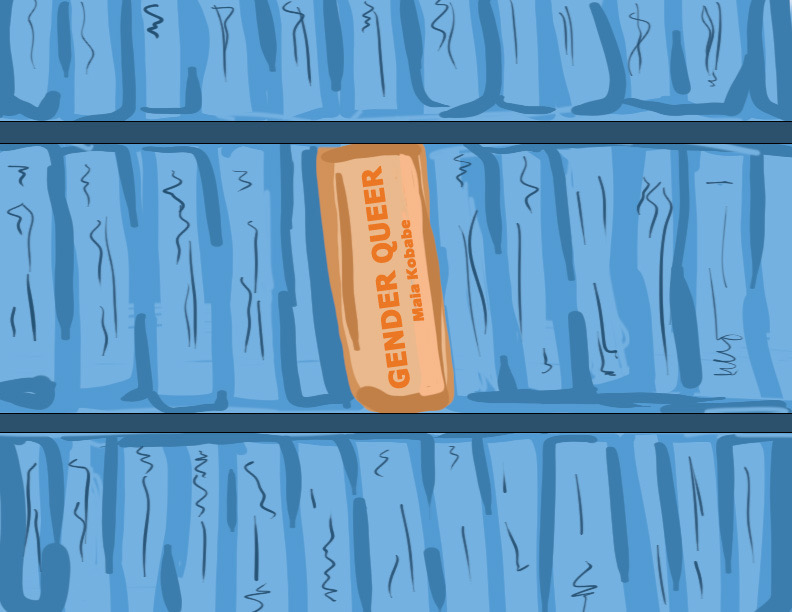RB students, staff respond to recent book controversy
January 19, 2023
The recent challenge of the graphic novel “Gender Queer: A Memoir” by Maia Kobabe at the Riverside Public Library has sparked a conversation within the Riverside-Brookfield community.
Upon the conclusion of the Riverside Board of Trustees meeting held January 10th, a decision was made to keep the graphic novel on shelves. This resolution aligns with the library’s vision and mission statement for 2023-2026.
“It met all of the criteria for our collection development policy. It was an award nominated book from the Lincoln Awards Master List, which is for young adults and teens, and we’ve always historically purchased the books on the list because the winner is ultimately chosen from them. And we do not believe in preventing people from reading,” Riverside Public Library Director Janice Foley said.
RB senior Thomas Dixon attended the meeting and spoke in favor of keeping the book available.
“It was pretty nerve-wracking. I was pretty scared. I didn’t really have anything prepared per se. I just went to see what was going to go down and because I [wanted] to make sure that they didn’t end up banning it,” Dixon said.
Dixon was inspired to make his voice heard when points were made that he disagreed with.
“Some of the stuff they said struck a nerve in me and so I felt like my opinion and my point of view would have helped the board make this decision,” Dixon said.
Also an attendee of the meeting, senior Leo Martin was motivated to witness this event because of its significance to the community.
“I was really surprised at how many people actually showed up, and I felt really empowered that this is a cause that people fight for,” Martin said.
Foley recalls the event to have left her with one of the most impactful feelings she has ever experienced.
“To hear people talk and those who expressed how important the book or books like this were to them and just people who believed that, you know, we have the freedom to choose, it was… I mean I had tears in my eyes, it was so… I don’t know if I could pick a word. It was amazing to feel the support. I am so appreciative of the board for being so supportive as well. It was such a positive experience,” Foley said.
RB currently has three copies of the graphic novel in its library. RB librarian Amy Philips is a part of the reading committee, which includes a mix between teenagers and literary professionals, who chose “Gender Queer: A Memoir” to be one of the twenty books on the Lincoln Award list this year, four of which are chosen solely by the teens on the reading committee.
“Any of those books can be chosen by the teenagers, and the adults in the room can say nothing. They’re the ones who chose that ‘Gender Queer’ needed to be on this year’s list,” Philips said.
RB Librarian and Lab Aid Jennifer Shaker believes that this novel is a source for students to connect with and that it deserves a place within the library.
“It represents kids that go to school here. It represents adults that have gone to school here that might not have had anything like that to read when they were here,” Shaker said.
The memoir follows the author Maia Kobabe, who is a member of the LGBTQ+ community through their young adult life. The novel focuses on Kobabe’s struggles relating to gender and sexuality.
“I personally haven’t been faced with those same struggles, but I know a lot of people who have and I consider myself an ally. And so I think there certainly is a group of people at RB that this book means a lot to,” Dixon said.
Sharing a diverse range of stories allows voices to be heard from all types of communities.
“I think it is important to represent all demographics, including ones that get marginalized like the one in this book,” Martin said. “I thought that the book was very well made. It hits on a lot of aspects that I think don’t get put out as much.”
Learning about individuals that are different from yourself allows for a more complex understanding of the world around us. Philips encourages life-long learning through literature and believes that books are a way to see yourself and others in your community.
“Er’s [Maia Kobabe] perspective is one that I hadn’t always thought of. Why you choose to be called certain things isn’t one that maybe I hadn’t directly thought of, but I have learned those experiences through the various literatures that I’ve read,” Philips said. “Even if you are not part of that community, books and literature act as windows, mirrors, and sliding glass doors. It allows you to see yourself or see other people or learn to be a part of a larger community.”
Dixon believes that youth should be exposed to all types of literature in order to grow as individuals.
“It can’t just be certain things we deem safe or appropriate. I mean, if you want to develop opinions and thoughts that are in-depth and important, you need all the views. You can’t just base your opinion off one view. You need to see the other side of things even if you disagree with it,” Dixon said.
One of the points made by the individuals in favor of removing the graphic novel regarded some of the images depicted within the story.
“They were making the point that when certain images come up, kids in the 12-17 age range can be affected negatively and I sort of thought that wasn’t one hundred percent true. It’s kind of a broad generalization,” Dixon said.
Shaker makes the argument that looking at the work as a whole and avoiding oversimplification is key to understanding the significance of the work in its entirety.
“I think now it’s being spun in different ways, like trying to say they were pornographic, and I think it’s easy to take things out of context and that’s when you can pick up speed with arguments for censorship,” Shaker said. “The people who are bringing an argument about it need to read the whole book and you can’t cherry pick what you don’t like out of something.”
Assistant Principal of Curriculum and Instruction Kylie Lindquist comments on the large-scale ripple effect censorship can have in all libraries. All types of books serve as a source of knowledge and that valuable information should not be withheld.
“Before becoming RB’s Assistant Principal for Curriculum and Instruction, I was an English teacher, so this topic speaks to me on a lot of levels. When it comes to censorship, I always ask, ‘What’s next?’” Lindquist said. “If people are successful in removing one book from a collection, is that enough? Which book will be next? How many more will there be? And, ultimately, what is the standard? The truth is, there isn’t one universal standard by which all books can be judged to determine their ‘fitness’ for a library’s collection and that is why, ‘as cliche as it sounds,’ censorship is a slippery slope. At what point will enough be enough? What information or perspective will be on the ‘proverbial chopping block’ next? As a society we are better served to teach people how to discover and evaluate information/resources to use them appropriately and for greater good rather than to decide for people what they can and cannot read.”



